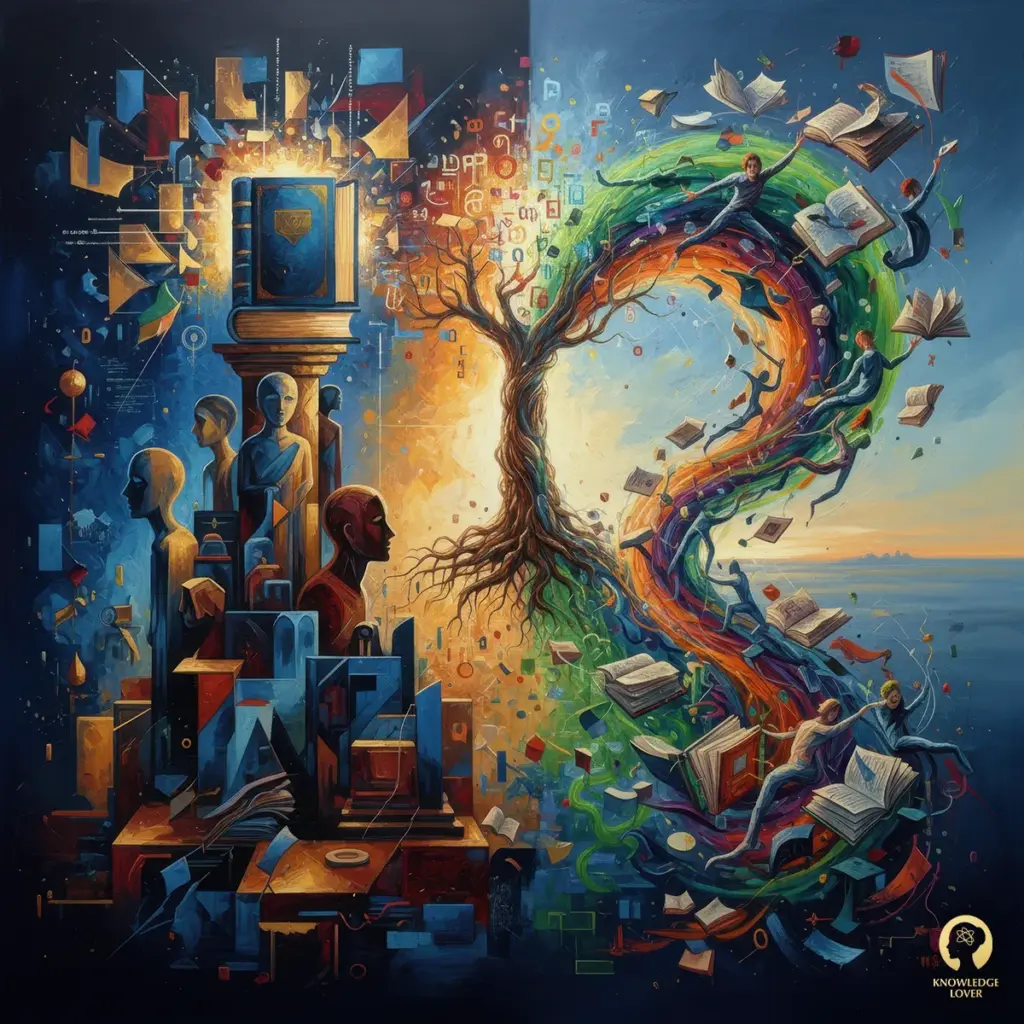Knowledge Lovers Vs Lifelong Learners

There’s a distinction I’ve been thinking about for years now, one that keeps revealing itself in conversations, in the patterns of my own reading life, in the way different people I admire approach their intellectual pursuits. It’s the difference between loving knowledge and committing to lifelong learning – two things that sound similar but diverge in ways that matter profoundly.
Most of us assume these terms are interchangeable. Both involve curiosity, reading, engagement with ideas. Both suggest something admirable about a person’s priorities. Yet the more closely I’ve observed these two orientations, the more convinced I’ve become that they represent fundamentally different relationships with learning itself.
Who Is a Knowledge Lover?
A knowledge lover is someone whose primary intellectual drive is the acquisition and accumulation of information across diverse subjects. They experience genuine pleasure in the moment of discovery -when something unknown becomes known. Their satisfaction comes from having learned something, from expanding their mental repository of facts, concepts, and ideas.
Think of them as intellectual collectors. They read widely, consume content voraciously, and take pride in their breadth of understanding. Their joy is in the “aha!” moment, in being able to say “I know about that” or “I’ve read her work.” Knowledge, for them, is somewhat like a possession – something to gather, organize, and occasionally display.
A knowledge lover – what the Greeks called a philomath – experiences genuine pleasure in acquiring information. They collect facts the way others might collect art or vintage records. Their satisfaction comes from the accumulation itself, from being able to say “I know this now” or “I’ve read that.”
This isn’t a shallow pursuit. Knowledge lovers often possess remarkable breadth. They might understand evolutionary biology, speak conversationally about Baroque music, explain blockchain technology, and quote Mary Oliver with equal facility. Their minds are vast, interconnected territories where ideas from different domains spark against each other.
Learn more about Knowledge Lovers: Who Is a Knowledge Lover?
Characteristics of Knowledge Lovers
Intellectual Appetite and Range
The knowledge lover’s reading list sprawls across genres and centuries. They subscribe to multiple podcasts, watch documentaries on obscure subjects, take online courses in fields far from their professional expertise. There’s something admirable about this refusal to be confined, this hunger for more.
The Joy of Discovery
Watch a knowledge lover encounter something new – their face brightens, their speech quickens. That moment when ignorance transforms into understanding delivers a particular kind of pleasure, almost chemical in its immediacy. They’re chasing that feeling, and it propels them from subject to subject.
Knowledge as Possession
Here’s where the first crucial distinction emerges. For knowledge lovers, information becomes something to have, to own, to accumulate. The joy peaks at acquisition. Once something is known, the excitement begins to fade, and they turn toward the next unknown thing.
Who is a Lifelong Learner?
A lifelong learner is someone whose relationship with learning centers on personal transformation and continuous self-evolution. They’re not primarily interested in accumulating knowledge but in allowing what they learn to fundamentally change how they think, perceive, and act in the world.
Their satisfaction comes from the process of becoming rather than having. They often return to the same texts, ideas, or practices repeatedly because they understand that they bring a different self to each encounter. Learning, for them, is inseparable from living – it’s about developing wisdom, refining judgment, and integrating insights into their character and daily choices. They measure success not by what they know but by who they’re becoming through the learning process.
Lifelong learners operate from an entirely different premise. They’re not primarily collecting information; they’re allowing themselves to be changed by what they encounter. Learning, for them, is transformation rather than accumulation.
Characteristics of Lifelong Learners
Depth Over Breadth
A lifelong learner might return to the same book five times across twenty years. Not because they forgot what it said, but because they’re different people each time they read it. The text hasn’t changed, but they have, and this new version of themselves finds different wisdom in familiar words.
I think of how I read Thoreau’s Walden at nineteen versus thirty-five versus now. The book remained constant; I was the variable. Lifelong learners understand this intuitively.
Integration Into Life
Where knowledge lovers keep what they know somewhat separate from how they live, lifelong learners actively work to close that gap. They read about communication and then examine their own conversations. They study philosophy and then test its ideas against their actual experience. The membrane between learning and living is deliberately porous.
Transformation as the Goal
Success, for a lifelong learner, isn’t measured by how much they know but by who they’re becoming. Have their prejudices softened? Has their judgment improved? Are they more capable of nuance, more comfortable with uncertainty? These are the questions that matter.
Key Differences: Knowledge Lovers Vs Lifelong Learners
Let me map out these distinctions more systematically:
| Aspect | Knowledge Lover | Lifelong Learner |
|---|---|---|
| Primary Goal | Accumulating information | Personal transformation |
| Reading Style | Wide-ranging, quick absorption | Deep, repeated engagement |
| Success Metric | What they know | Who they become |
| Relationship to Difficulty | May abandon challenging material | Sees difficulty as essential |
| Time Preference | Immediate satisfaction | Long-term development |
| Social Expression | Sharing expertise | Exploring uncertainty |
| Application Focus | Optional | Central to the process |
| Motivation Source | Curiosity and novelty | Self-cultivation and wisdom |
The Application Question
This might be the most revealing difference. Knowledge lovers can discuss concepts brilliantly while remaining unchanged by them. They understand stress management without managing their own stress. They know relationship psychology without improving their relationships. The knowledge sits in one compartment while life unfolds in another.
This isn’t hypocrisy. It’s just a particular configuration where knowing and being occupy separate spaces.
Lifelong learners, conversely, are drawn to ideas precisely because they want to change. They test concepts against reality, allowing the friction between theory and practice to generate new understanding. They’re different six months after reading something transformative because they’ve tried to live it.

Why Motivation Matters: Sustainability of Learning
The engine that powers these two approaches differs significantly, and this affects whether people sustain their learning over decades or lose momentum.
The Knowledge Lover’s Challenge
Curiosity is a powerful but fickle force. It follows novelty, and when a subject becomes familiar, interest often wanes. The knowledge lover might abandon depth for breadth, always chasing that next dopamine hit of discovery.
Our digital age amplifies this tendency. Infinite content feeds the appetite for novelty while making sustained depth nearly impossible. You can spend a lifetime skimming surfaces, feeling informed but never transformed.
The Lifelong Learner’s Advantage
Lifelong learners draw from a deeper well. Their motivation connects to fundamental questions: How should I live? What kind of person do I want to become? What really matters?
This orientation creates greater sustainability. When learning gets difficult – and genuine learning always does – they persist because difficulty is where transformation lives. The frustration of not-yet-understanding is itself part of the journey.
The Social Dimension: How Each Type Engages With Others
Knowledge lovers often enjoy displaying what they know. They’re the ones who correct misconceptions at dinner parties, recommend books unsolicited, cite studies to win arguments. Knowledge serves partly as social currency, establishing intellectual credibility.
I don’t mean this dismissively. Conversations genuinely benefit from people who know things, who bring historical context or scientific precision to otherwise vague discussions. But there can be an underlying competitiveness, an implicit ranking of who knows more or has read the more impressive texts.
Lifelong learners typically speak more tentatively. They’re comfortable saying “I’m still figuring this out” or “I used to believe X, but now I’m not sure.” Their learning isn’t performed but inhabited. They might be less impressive at cocktail parties but more genuinely open to having their minds changed, to learning from whoever they’re speaking with.
The Path to Wisdom: Which Approach Gets You There?
Here we reach the heart of the matter. Knowledge and wisdom are not synonyms, and accumulating the former doesn’t automatically produce the latter.
Knowledge Without Wisdom
A knowledge lover can know the entire history of ethics without becoming more ethical. Can understand psychology without achieving psychological health. Can study philosophy without developing philosophical temperament. The information exists separately from character.
Wisdom Through Transformation
Wisdom requires knowledge as foundation – you cannot be wise about things you don’t understand – but wisdom also demands something more: judgment, perspective, humility, and the capacity to hold contradictions without collapsing into simplistic certainty.
The lifelong learner’s commitment to transformation creates conditions where wisdom can emerge. By allowing learning to reshape perception, judgment, and action, they engage in what ancient Greeks called paideia – lifelong character formation through engagement with worthy ideas.
“In youth we learn; in age we understand.” – Marie von Ebner-Eschenbach
This captures something essential. Knowledge lovers may simply become more knowledgeable as they age. Lifelong learners often become more interesting, more themselves, because they’ve been genuinely changed by their encounters with ideas.
Practical Strategies: Bridging Both Approaches
Must these be opposing identities? Can’t someone embody both the enthusiasm of the knowledge lover and the depth of the lifelong learner?
Absolutely. The key is conscious integration.
1. Implement Reflective Reading Practices
After finishing any book, spend thirty minutes writing about how it affected your thinking rather than summarizing its contents. Ask: What shifted? What do I see differently now? Where might this change my behavior?
2. Practice Strategic Limitation
Instead of constantly adding books to your list, spend time digesting what you’ve already consumed. Six books deeply integrated will transform you more than sixty books superficially encountered.
3. Seek Concrete Application
For every new concept, identify one specific way it might influence your decisions, relationships, or daily habits. Knowledge without application remains abstract.
4. Embrace Productive Difficulty
When material challenges or confuses you, resist moving on quickly. Confusion often signals the threshold of genuine learning. Stay with it.
5. Cultivate Intellectual Humility
Notice when your desire to display knowledge exceeds your commitment to understanding. The most profound learning happens when we admit what we don’t know.
6. Return to Primary Sources
Rather than accumulating summaries and commentaries, engage directly with original texts. Allow yourself to be changed by those voices rather than filtered interpretations.
The Digital Age: New Challenges for Both Types
Our technological moment complicates everything.
Challenges for Knowledge Lovers
- Infinite information feeds acquisitive instincts dangerously
- Algorithms serve endless novelty matched to existing interests
- Social platforms reward knowledge displays with likes and engagement
- But depth becomes nearly impossible when surfaces are so seductive
- The illusion of understanding is easier to maintain than ever
Challenges for Lifelong Learners
- Sustained focus requires active resistance to constant distraction
- Deep reading competes with hyperlinks and notifications
- Transformation requires time that feels increasingly scarce
- Yet digital tools can support practice when used intentionally
- Access to diverse perspectives can actually accelerate growth
Why This Distinction Matters Now
Understanding our relationship with knowledge has never been more urgent. We live in an age of information obesity – minds stuffed with facts but lacking the metabolic capacity to transform them into wisdom.
The knowledge lover’s approach, taken to extremes, produces people who are impressively informed but not necessarily capable of sound judgment, genuine growth, or meaningful contribution. They know much but remain fundamentally unchanged.
The lifelong learner’s approach offers what our polarized moment desperately needs: people genuinely capable of growth, who can revise thinking when confronted with new evidence, who understand that learning is about becoming truer versions of themselves rather than simply being right.
A Personal Reflection on Balance
I’ve been both types at different points. In my twenties, I was pure knowledge lover – consuming books at an almost frantic pace, proud of how much I knew, eager to demonstrate my intellectual range. I measured success by books read, facts accumulated, concepts grasped.
Somewhere in my thirties, something shifted. Perhaps it was encountering the same problems repeatedly despite all my knowledge. Perhaps it was noticing that the people I most admired weren’t necessarily the most widely read but the most deeply changed by what they’d encountered.
I began rereading more. Slowing down. Asking different questions. Not “what does this say?” but “what does this mean for how I live?” The satisfaction changed texture – less immediate but more sustaining, less about the thrill of novelty and more about the slow work of transformation.
Final Thoughts: Both Paths Matter
The finest minds embody both qualities. They range widely but root deeply. They collect voraciously but digest thoroughly. They know much yet remain perpetually open to knowing differently.
What matters isn’t which camp you belong to but whether you’re aware of your tendencies and willing to cultivate what you lack. If you’re naturally a knowledge lover, practice depth. Return to what changed you. If you’re inclined toward lifelong learning, give yourself permission to range more widely sometimes. Not everything must transform you.
Socrates suggested the examined life is the only one worth living. Maybe what he meant was not that we should know everything, but that we should allow what we know to shape us, to make us more fully human, more capable of navigating existence with wisdom and grace.
Both the knowledge lover and the lifelong learner are engaged in the same essential project: making meaning in a universe that doesn’t automatically provide it, using consciousness to transcend our limitations and touch something larger than ourselves.
The question isn’t which path to choose but how consciously we walk it, how deeply we allow ourselves to be affected by what we encounter, and whether we emerge not just more knowledgeable but somehow, mysteriously, more whole.
Understanding the difference between knowledge accumulation and transformative learning can help you develop a more intentional approach to personal growth and intellectual development. Whether you identify more as a knowledge lover or lifelong learner, recognizing these patterns empowers you to cultivate the qualities you most need for your own journey.
